The William Davidson Institute (WDI) at the University of Michigan received a grant from Deutsche Gesellschaft für Internationale Zusammenarbeit (GIZ) through its Inclusive Business Action Network (IBAN) initiative to implement the project, “Selecting the Right Partners: Strategies to Support Inclusive Business Scaling.” The project built on prior research supported by IBAN to further understand the process of developing robust partnership ecosystems, specifically in context of Base of the Pyramid (BoP)-oriented inclusive businesses (IBs).
The project was made up of two main stages: Stage 1, Building the Right Portfolio and Stage 2, Partnership Building. During Stage 1, the question, “Which partners should enterprise leaders prioritize as most crucial to enabling sustainable, scalable inclusive business development?” was explored. Stage 2 focused on the question, “Once these inclusive business leaders have identified their priority partners, what are the strategies and processes they will need to use to develop and maintain these relationships to maximize effectiveness?”
During the past decade Walmart has opened up several channels for distributing products sourced from small producer enterprises in its stores and on its digital platforms. The overall purpose of the project is to present both the challenges and success factors involved when integrating small producers and enterprises, particularly artisans and small holder farmers, into the organized retail supply chain. The intention will be to help other businesses and organizations who wish to engage in such programs, and to show where the involvement of governments, NGOs, and other industry sectors is essential to achieving desired outcomes. The illustrations will include specific examples from Empowering Women Together and Walmart’s local food sourcing programs, both of which undertake to integrate small businesses and producers and women-owned enterprises into the supply chain. The project will result in both a policy brief aimed at the retail sector, and a teaching case that facilitates better understanding of the challenges and success factors in integrating small producers at the base of the pyramid into formal retail supply chains.
The William Davidson Institute (WDI) at the University of Michigan received a grant from Deutsche Gesellschaft für Internationale Zusammenarbeit (GIZ) through its Inclusive Business Action Network (IBAN) initiative to implement the project, “Selecting the Right Partners: Strategies to Support Inclusive Business Scaling.” The project built on prior research supported by IBAN to further understand the process of developing robust partnership ecosystems, specifically in context of Base of the Pyramid (BoP)-oriented inclusive businesses (IBs).
The project was made up of two main stages: Stage 1, Building the Right Portfolio and Stage 2, Partnership Building. During Stage 1, the question, “Which partners should enterprise leaders prioritize as most crucial to enabling sustainable, scalable inclusive business development?” was explored. Stage 2 focused on the question, “Once these inclusive business leaders have identified their priority partners, what are the strategies and processes they will need to use to develop and maintain these relationships to maximize effectiveness?”
This report was supported by a grant from Wal-Mart Stores Inc. and produced through a collaboration between The William Davidson Institute at the University of Michigan and Oxford University Consulting. It examines the lessons learned from Walmart’s engagement of small producers in developing countries in two arenas. The first includes a series of efforts over the past ten years to incorporate smallholder farmers into Walmart’s agricultural supply chain. The second effort, Empowering Women Together, endeavored to sell handicrafts made by women-empowering cooperatives through Walmart.com.
Increasing the productivity of small producers and facilitating access to markets, are key pathways to sustainable, and scalable poverty alleviation in developing countries.
This report was supported by a grant from Wal-Mart Stores Inc. and produced through a collaboration between The William Davidson Institute at the University of Michigan and Oxford University Consulting. It examines the lessons learned from Walmart’s engagement of small producers in developing countries in two arenas. The first includes a series of efforts over the past ten years to incorporate smallholder farmers into Walmart’s agricultural supply chain. The second effort, Empowering Women Together, endeavored to sell handicrafts made by women-empowering cooperatives through Walmart.com.
Increasing the productivity of small producers and facilitating access to markets, are key pathways to sustainable, and scalable poverty alleviation in developing countries.
Download Full Report
Download Executive Summary Only
To facilitate the process of evaluating sourcing scenarios involving small producers, we have created the Sourcing Readiness Checklist. Using this checklist, organizations can consistently assess how each potential sourcing strategy scores across the 18 influencing factors that are associated with four performance factors.
Download Sourcing Readiness Checklist
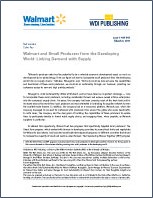
This case explores Walmart’s experience in incorporating small producers (women-owned or women-empowering artisan enterprises, and smallholder farmers) into its global supply chains. The case is written from the perspective of Kathleen McLaughlin, the president of the Walmart Foundation and chief sustainability officer at Wal-Mart Stores, Inc. This dual role gives her responsibility for exploring how best to link philanthropic activities with company resources to fulfill Walmart’s global social commitments while positively impacting business outcomes. The case opens with McLaughlin and her Walmart colleagues Kara Valikai and Chris Cochran contemplating the performance of both their Direct Farm and Empowering Women Together (EWT) programs, and how they might be enhanced going forward.
Download Case
This case explores the evolution of the cross-sector relationship between Wal-Mart Stores, Inc., Walmart Foundation and the U.S. Agency for International Development (USAID) from 2000-2015. It focuses on partnerships that sought to build the capacity of smallholder farmers in the developing world. The case explores the ways in which this collaboration came about, how it was supported by the partners, and the level of success achieved as measured by the Wal-Mart Stores, Inc., Walmart Foundation, and USAID. The case dilemma is to identify learnings drawn from these partnerships and determine how they can be applied to a more ambitious approach to collaboration. From Walmart’s perspective, further collaboration with USAID could result in a partnership strategy that yields both significant social impact and important business outcomes. However, the partnership model had to enable innovation and flexibility, while maintaining efficiency, sustainability, and scalability.
Download Case
A new report co-written by WDI’s Scaling Impact Initiative that investigates Walmart’s efforts to incorporate small producers into its global supply chain was presented today at the 7th Annual Global Entrepreneurship Summit 2016. The summit, held in Silicon Valley, Calif., is one of the foremost gatherings of the world’s preeminent entrepreneurs and featured a keynote address by President Barack Obama.
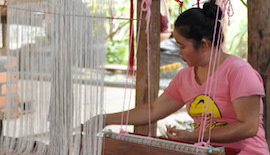
“Incorporating Small Producers into Formal Retail Supply Chains” focuses on lessons learned by Walmart in its efforts to bring smallholder farmers and female artisans from developing countries into its retail infrastructure.
An earlier WDI study, which was turned into the teaching case “Walmart and USAID: The Evolution of a Global Cross-Sector Partnership,” examined Walmart’s attempts over the past 10 years to bring smallholder farmers into its agricultural supply chain in partnership with USAID. Linda Scott, Emeritus DP World Chair for Entrepreneurship and Innovation at Saïd Business School at the University of Oxford, had previously looked at the retailer’s efforts to sell the handicrafts made by women-owned businesses through Walmart’s online consumer marketing.
For the report presented at the summit, the research team consisting of Ted London, vice president of the Scaling Impact Initiative, Colm Fay, research manager of the Scaling Impact Initiative, and Scott, interviewed key stakeholders, analyzed relevant data, and developed a set of strategies and frameworks based on Walmart’s experiences in Africa, Asia, and Latin America.
Walmart had mixed success in its efforts to engage with smallholder farmers and artisans, and was interested in understanding and sharing what had worked and what had not.
“They faced some real challenges and they wanted to share these with the broader community,” Fay said.
While difficult, success is possible. The report found that small producers could be integrated into the global supply chain of a large retailer. The key is understanding the current capabilities of the supplier, as well as key aspects of the product, market, and ecosystem in which the product operates.
In order for small producers to be successful, retailers, development organizations and local governments may need to partner and invest in things such as improved credit systems, transportation, and market information.
The paper identified four performance dimensions and 18 influencing factors that indicate whether a retailer could successfully engage with a small producer. A Sourcing Readiness Checklist provides an actionable approach for retailers to systematically assess whether their sourcing strategies are likely to have a positive impact.
London said the report should provide insights for other formal retailers who are already engaging with small producers or are considering it.
“We don’t just need to encourage retailers to engage with small producers, we need to help these retailers execute more effectively,” he said. “That’s the real goal and the focus of the report.”
London also said that a teaching case for WDI Publishing will be developed out of this latest project.
The report and checklist are available to download free on WDI’s website at: www.wdi.umich.edu/walmart.
Photo credit: Shankar S. on Flickr
Ted London, WDI Senior Research Fellow and Vice President of the Scaling Impact Initiative, authored the following post for NextBillion.net in which he describes a new framework for creating partnerships that help enterprises achieve sustainable, scalable impact. This article was originally published May 16, 2016 on NextBillion.
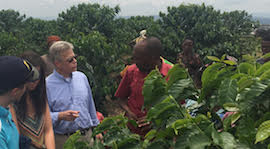
If you’ve worked in any industry or sector long enough, you start to see some patterns.
I have been working in the base of the pyramid (BoP) domain since 1989. During that time, I have been fortunate to engage with many entrepreneurs and business leaders seeking to develop and launch enterprises in BoP markets. When I first meet these entrepreneurs, they are excited and passionate about their potential impact. They have a product or service and a proposed business model. Often they have won some sort of business competition or have some internal corporate seed funding. They are on their way, with the next big milestone being additional capital.
These are smart, committed people. Some have come to this point in their lives with substantial business experience in developed world markets. Others are fresh out of school. As we run into each other over time, I see the same thing happening again and again. They begin to recognize how much they didn’t know about BoP markets, and all of this leads to a déjà vu scene that has happened all too often:
“We thought we knew what we were doing, but we have made all the mistakes in the book,” lamented a colleague, who is an experienced entrepreneur in the technology industry. He believed his experience as a successful top-of-the-pyramid entrepreneur would translate well into a BoP context. It didn’t work out that way for him – or for many others.[1]
BoP entrepreneurs and enterprise leaders aren’t destined to repeat his experience. But first we need to change our thinking and adopt new tools to keep us from falling back into old patterns.
For too long, the implicit assumption seems to have been that each enterprise has to respond in a unique way to the specific context it faces. This thinking has downplayed the value of understanding lessons learned and the opportunity to use experience – both successful and less so – to understand best practices.
To be sure, each BoP enterprise faces a distinct context. But so does each enterprise in the developed world. Yet that hasn’t constrained the development of strategies, tools, frameworks and processes that business leaders can use to navigate the complexities of the environment in which they operate. To name just a few, there are Porter’s five forces, the four Ps of marketing and the SWOT analysis. What each of these has in common is a standardized framework that can then be customized to reflect the local realities that different enterprises face.
These frameworks, however, were designed for developed world markets. BoP enterprises operate in an impoverished environment and seek to serve impoverished people. While BoP enterprise development is not about reinventing the principles of business – enterprises must create the right internal design, plan for scale, build a viable value proposition and seek the right partners – it is about recognizing that these principles need to be applied in different ways. This means that the frameworks made for the developed world may not be sufficient or correct.
What we need is a toolkit that is specifically developed with the BoP context in mind. BoP enterprise leaders need standardized frameworks that they can modify to their unique context. At the very least, such a guide will help these enterprise leaders avoid some classic mistakes that many BoP ventures seem to make over and over, while providing a roadmap for their journey to scale.
The good news is that as a community we have begun to develop a set of tools, frameworks and strategies derived from examining and understanding success and disappointment in the field. These include the Business Model Innovation Framework (for developing an appropriate internal design), the Co-create, Innovate, Embed Framework (for moving from design to pilot to scale) and the BoP Impact Assessment Framework (for building a viable value proposition from the perspective of the BoP). These are all valuable tools and methodologies for managing growth and impact. I am proposing that we add the Partnership Ecosystem Framework (PEF), a tool that helps prepare the enterprise for building the cross-organizational collaborations needed for sustainability at scale.
In exploring partnerships, enterprise leaders have been guided by an interesting but incomplete question: “Who should we partner with?” While helpful, this question also sends BoP entrepreneurs and business leaders down a false path. Indeed, the trap for too many BoP business leaders is to focus on finding one partner – often someone who can provide financing – or finding partners in a sequential manner, one after the other.
A better question is: “How can we build a robust and evolving partnership ecosystem?”
Operating in an impoverished market with impoverished consumers and producers means that the enterprise faces a market environment where key building blocks may not exist, or may operate in very different ways. To overcome these gaps in a cost-effective manner, enterprise leaders must consider a range of potential partners that can provide support across a wide range of functions – for example, helping to facilitate operational activities, providing access to needed financial and other resources, influencing supply and/or demand or otherwise enhancing the context in which the enterprise operates.
Getting the question right is a good first step, but doesn’t fully solve the problem. The enterprise’s leadership team must still develop a proactive and effective partnership strategy that maximizes access to the resources available from potential partners. And these partners use a variety of approaches, including business accelerators, impact investment funds, last-mile distribution and strengthening market systems, to support to BoP enterprise development.
This is where the PEF comes into play. It is a standardized framework that allows enterprise leaders to strategically consider who should be in their partner ecosystem. By customizing to their specific situation and content, these enterprise leaders can systematically understand their capability set, their current partner portfolio, and then assess where the key partner needs remain.
The PEF organizes support from partners based on the focus and type of that support. As shown on the horizontal axis, support can target either enterprise development or market creation. The former provides support directly to specific enterprises. The latter focuses on creating a better market environment, which can benefit all enterprises serving that market.
Meanwhile, differences in the type of support are captured on the vertical axis. Support directed at capacity building increases the stock, or the value of assets, including an enterprise’s resources or a market’s infrastructure. Support directed at action enabling enhances the flow, or the total value of transactions, by facilitating enterprise activities and market transactions.[2]
This generates four quadrants that capture the landscape of support that can be provided by potential partners (see Figure 1 for a subset of possible support from partners). The result is a diagnostic tool that enterprise leaders can use to develop and manage their partnership portfolio.
The PEF is a standardized framework that BoP enterprise leaders can customize to their own situation. Our work in the field has shown the value of such an organized approach.[3] These leaders can better: 1) assess where partnership support is most crucial, 2) plot their existing set of partners and the support they are currently providing, and 3) identify key gaps that remain. This leads to actionable strategies that enable a BoP enterprise to build and maintain an integrated and evolving ecosystem of partners that responds to key challenges in the enterprise’s journey to sustainability and scalability.
This is a key part of the future of BoP enterprise development – standardized strategies, frameworks and processes that can be customized to the local context. At the very least, these will help enterprises avoid some classic mistakes. Better yet, this toolkit of frameworks can offer a blueprint for increasing the likelihood of an enterprise’s success.
Ted London is Vice President and Senior Research Fellow for Scaling Impact Initiative at the William Davidson Institute. He is also a faculty member at the Ross School of Business at the University of Michigan. His most recent book is The Base of the Pyramid Promise: Building Businesses With Impact and Scale.
If you’ve worked in any industry or sector long enough, you start to see some patterns.
I have been working in the base of the pyramid (BoP) domain since 1989. During that time, I have been fortunate to engage with many entrepreneurs and business leaders seeking to develop and launch enterprises in BoP markets. When I first meet these entrepreneurs, they are excited and passionate about their potential impact.  They have a product or service and a proposed business model. Often they have won some sort of business competition or have some internal corporate seed funding. They are on their way, with the next big milestone being additional capital.
They have a product or service and a proposed business model. Often they have won some sort of business competition or have some internal corporate seed funding. They are on their way, with the next big milestone being additional capital.
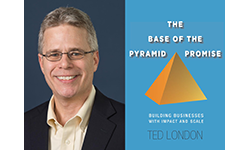
WDI Senior Research Fellow Ted London will be the featured guest for a May 17 webinar organized by Business Call to Action (BCtA) and the Practitioner Hub on Inclusive Business. Click here to register for the free webinar, which begins at 9 a.m. Eastern U.S.
London, who also leads the Institute’s Scaling Impact Initiative, will discuss his recently-released book, “The Base of the Pyramid Promise: Building Businesses with Impact and Scale.”
The webinar will be hosted Caroline Ashley, director of Ashley Insight and editor of Practitioner Hub. It will feature an interactive Q&A with the audience.
For more information:
NextBillion, one of the internet’s first media sites focused exclusively on social entrepreneurship and base of the pyramid venture development, recently celebrated 10 years online. As NextBillion’s parent organization for nearly half of that time, WDI sees a bright future for the site, which serves as a one-stop destination for in-depth original articles, curated news stories, career listings and important events across the broad spectrum of market solutions to poverty.

Launched in mid-2005, NextBillion was born out of “The Next Four Billion report,” one of the first academic studies to quantify the base of the pyramid market. The World Resources Institute, which published the report authored by Al Hammond, created NextBillion to facilitate discussions around the research. The site soon caught on, establishing a global community where entrepreneurs, academics, business leaders, NGO managers, global development agencies, students and policy makers converged around a shared goal, which later became NextBillion’s tagline: “Development Through Enterprise.”
Each year, NextBillion publishes hundreds of contributed articles and nearly as many job ads. Editors aggregate thousands of news stories and press releases, and post hundreds of important events on NextBillion’s calendar, such as conferences, workshops and webinars. They also provide live coverage and interviews at several key events each year. The detailed content on NextBillion drives knowledge and understanding in many sectors, including agriculture, healthcare, energy, technology, impact assessment and financial access. NextBillion contributors also delve deeply into the business models, affordable products, breakthrough technologies, investment strategies and private-public partnerships helping to change the economic fortunes of billions of people making a few dollars a day or less.
WDI’s formal involvement with NextBillion began in 2010 when it joined the World Resources Institute as a co-partner in the site. Two years later, WDI acquired NextBillion from WRI and has continued to manage the site as its parent organization. NextBillion’s editorial focus aligns well with WDI’s mission as a research and educational organization focused on providing private-sector solutions in emerging markets.
“NextBillion is different from other publications and media sites, in part, because of our focus on the practitioner who is working to create a more inclusive global economy,” said Scott Anderson, who has been managing editor since 2010. “Our contributors share a broad range of experiences and skill sets, from idea stage entrepreneurs to senior managers of Fortune 500 companies. Regardless of their titles or career paths, NextBillion is a place for these people to share and collaborate over business solutions to poverty-driven challenges.”
The NextBillion team also includes James Militzer, editor of NextBillion Financial Innovation, and Kyle Poplin, editor of NextBillion Health Care. They joined NextBillion to help the site provide even more comprehensive coverage of key sectors in social business through two topical sub-blogs. The first was NextBillion Health Care, which was launched in 2012 to explore new thinking, business models and technologies designed to improve people’s health and increase access to care. The second, launched in 2013, was NextBillion Financial Innovation, a blog and news resource dedicated to improving financial access for low-income people around the world. In addition, NextBillion also produces in-depth video interviews, extensive blog series and e-book collections that provide background and context for readers who want to explore issues more deeply.
“It has been very gratifying to watch the social business movement growing in tandem with NextBillion,” Militzer said. “While in our early days NextBillion was one of the only websites specializing in social enterprise, we’ve seen remarkable growth in both the sector and the media ecosystem that covers it. As we look toward our next decade online, we’re constantly exploring new ways that NextBillion can keep our dedicated readers informed, while familiarizing the broader public with the world of social business.”
“We take great pride in being a resource not just for creative thinkers, but for risk-taking do’ers,” Poplin added. “As an editor, it’s a treat to interact with and learn from people who want to make a positive difference in the world.”
NextBillion has served as a platform for discussion and debate, even when the criticism has turned to issues at the heart of the site itself. Over the years, contributors have questioned the effectiveness of base of the pyramid theory and business practices, as well as that of microcredit, for example. NextBillion also has published numerous articles and introspective blog posts from entrepreneurs and managers whose businesses or initiatives have failed, discussing what they have learned from the experience.
In the years since NextBillion joined WDI, traffic for the site has more than doubled and its social media following has grown exponentially. NextBillion now has more than 43,000 Twitter followers and over 11,000 on Facebook and LinkedIn.
While WDI contributes articles and serves as the parent organization, NextBillion retains editorial independence. The site also welcomes partnerships with organizations interested in promoting, shaping and participating in dialogue relevant to development through enterprise. With a dedicated audience and a social media community growing at more than 15 percent annually, NextBillion offers partners an effective dissemination platform to share knowledge and discuss the impact of their work.
NextBillion unveiled an all-new design in November 2015 that made the site easier to navigate and to share content.
“In the coming months and years, we hope to make the experience of connecting, sharing and contributing content to NextBillion even more valuable to our readers and to the development through enterprise community,” Anderson said.
Sir Fazle Hasan Abed was recently on the University of Michigan campus to receive a global health award. While there, he sat down with Kyle Poplin, editor for NextBillion Healthcare, an initiative of WDI, to talk about his work in Bangladesh. This article was originally published April 13, 2016 on NextBillion.
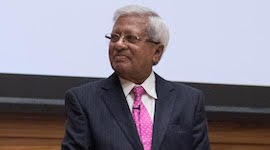
It was 1972 and Bangladesh was “an international basket case.” The Liberation War had just ended and the country was still reeling from the deadliest tropical cyclone ever recorded, Bhola, two years before.
The desperate conditions in his native country convinced Fazle Hasan Abed to quit his executive job at Shell Oil and try to help. But he couldn’t have foreseen the impact he would have on Bangladesh – and the world – when he founded what was originally a short-term relief effort called the Bangladesh Rural Advancement Committee.
That original group of a couple dozen people grew into what is now called BRAC, the largest non-governmental development organization in the world, with a $1 billion budget and 111,000 employees offering services to 138 million people. And Bangladesh, not coincidentally, has transitioned from the world’s second poorest country to lower middle income.
BRAC’s overarching philosophy is that poverty has many causes, so many solutions are needed. The organization provides programs in microfinance, education, health care, job training, empowerment of women, sanitation, agriculture, etc., and owns 16 social enterprises that provide $700 million in revenue. The remaining $300 million in revenue is generated through donations.
Abed – now officially Sir Fazle after being knighted by Queen Elizabeth II – has been called one of the world’s 50 greatest leaders, and was hailed as “a public health hero” when the University of Michigan awarded him one of its most prestigious honors, the Thomas Francis Jr. Medal in Global Public Health, on April 6.
The next day, in a sit-down interview with NextBillion, the 80-year-old talked about his four-decades-and-counting quest to empower the poor.
“The greatest influence on me about people’s lives and poverty was my mother. She was very concerned about poverty and poor people and she tried to help them as much as she could,” he said. “(After starting BRAC) I got to know poverty firsthand in the villages of Bangladesh. I became more aware of the multidimensional aspect of poverty. It’s not just lack of income, it’s lack of opportunities, lack of health care, lack of education. It’s all kinds of deprivation that constitutes poverty. Ultimately, it’s also powerlessness to do something about poverty, how to come out of it.
“In the old days, one used to think that one takes resources to the poor people and distributes them, and they come out of poverty. But we thought you have to involve the poor people themselves in the fight against poverty.”
He said he developed that concept – considered revolutionary in the ’70s – from reading “Pedagogy of the Oppressed” by Brazilian educator Paulo Freire. “Oppressed people have got their own way of thinking about life,” Abed said, “and if you can somehow mobilize them, make them critically aware of their own condition, and get them to act on their own behalf, make them an actor in their own history, then things become much easier.”
Perhaps the best example of Abed and BRAC putting that idea into practice was an oral rehydration therapy (ORT) program aimed at ultra-poor women in Bangladesh starting in the early 1980s. Diarrheal disease, the second leading cause of death in children under age 5, leads to dehydration, but it can treated with a simple mixture of water, sugar and salt known as ORT. Conventional wisdom held that illiterate, uneducated women were incapable of properly mixing and administering ORT, but BRAC taught millions of women from Bangladesh’s slums and villages how to do it. And today Bangladesh’s ORT rates are among the best in the world.
BRAC also pioneered a “graduation model” that empowers the ultra-poor to move from safety net programs to income-earning activities and self-sufficiency.
In the free-ranging video interview below, Abed talks more about BRAC’s future than its illustrious past.
He’s optimistic, for example, about the next generation of businesses that might help support BRAC, highlighted by a transition from a free to paid education model. He believes everyone can afford to pay $10 to $15 a month to ensure their children’s future, so BRAC is “looking into providing quality education for poor people.”
He’s wary of religious fundamentalism. The interview was conducted the day after a secular blogger was hacked to death in Bangladesh – the fourth such incident this year – in an attack attributed to a local chapter of al-Qaeda. Abed said that while “intolerant religion is becoming quite a force in our society,” it hasn’t yet had much of an impact on BRAC’s empowerment efforts, specifically of women, and he hopes such intolerance can be kept under control.
And he’s certain that it is, indeed, possible to eliminate extreme poverty worldwide, in accordance with Sustainable Development Goal No. 1. As one might expect, he’s got a plan in mind: